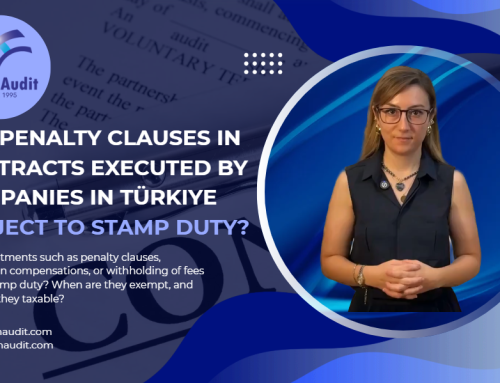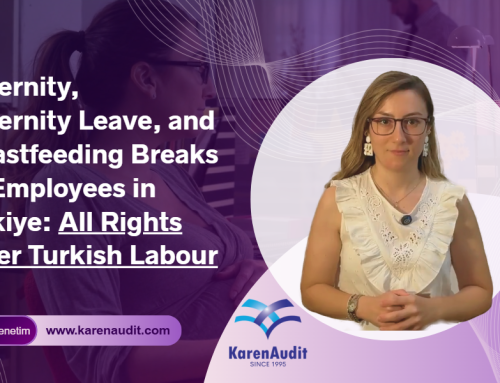(Date: 28.5.2021)
RESOURCE UTILIZATION SUPPORT FUND
What is Resource Utilization Support Fund (RUSF)?
- RUSF is a fund obtained over loans used and forward imports, regardless of real or legal persons.
- RUSF deductions are recorded as income in the general budget.
What is the Purpose of the Resource Utilization Support Fund?
- The Central Bank of Republic of Turkey launched the RUSF application as a credit and monetary policy tool in 1988.
- The Central Bank of Republic of Turkey followed and implemented RUSF de facto until 2002. After 2002, the monitoring and collection of RUSF was transferred to the Ministry of Finance of Republic of Turkey.
What is the Legislation Regulating the Resource Utilization Support Fund?
- The basic explanations regarding the implementation of the fund were made in the Communiqué No. 6 on RUSF Regarding the Decree No. 88/12944 dated 12.05.1988 published in the Official Gazette dated 26.08.1989 and numbered 20264 and the Law No. 4684.
What Transactions Are Resource Utilization Support Fund Deduction Made Through?
- Transactions on credit with RUSF deduction are as follows:
– Consumer loans from domestic banks and financing companies
– Loans obtained from abroad by residents of Turkey
* In TL
* In foreign currency
– Forward Import transactions
From Whom Does the Resource Utilization Support Fund Deduction Be Made?
- RUSF is obtained from people who use consumer loans within the country, use loans from abroad, and make forward imports.
Who are the taxpayers of the Resource Utilization Support Fund?
- RUSF’s payers are as follows:
- Banks,
- Financing companies,
- People who make forward imports.
On What Amount Is Resource Utilization Support Fund Deduction Made?
- RUSF deduction is made over the following amounts;
- Interest amounts accrued on Turkish Lira loans,
- For foreign currency indexed and other indexed loans, the total amount of the exchange rate difference or index difference related to the debt balance and the Turkish Lira equivalent of the current rate of the period interest or the spread,
- In foreign currency and gold loans, the principal amount and gold amounts of the loan on the date the loan is used,
- Import fee in forward import
What are the Resource Utilization Support Fund Deduction Rates?
- RUSF deduction is made at the following rates:a) Provided by banks and financing companies,
– 15% in consumer loans,
– 0% in other loans,
b) 0% in loans obtained from abroad by banks and financing companies,
c) Other than banks and financing companies, those resident in Turkey provide from abroad
1% in TL loans with an average maturity of up to 1 year
0% to 3% according to the average maturity in foreign currency and gold loans,
d) 6% in forward imports
Resource Utilization Support Fund Application in Consumer Credit
- RUSF deduction is made on the interest amounts accrued in consumer loans.
- For example, if we assume that a person uses a 5-month consumer loan in the amount of 5.000 TL with 1.09% interest from the bank, the table regarding the amount of RUSF in the installments and installments to be paid by this person is as follows.
|
Installment Number |
Installment Amount | Principal | Interest | RUSF | Banking and Insurance Transaction Tax |
| 1 | 1.039,58 | 974,17 | 54,50 | 8,18 | 2,73 |
| 2 | 1.039,58 | 986,93 | 43,88 | 6,58 | 2,19 |
| 3 | 1.039,58 | 999,83 | 33,12 | 4,97 | 1,66 |
| 4 | 1.039,58 | 1012,91 | 22,23 | 3,33 | 1,11 |
| 5 | 1.039,59 | 1026,16 | 11,19 | 1,68 |
0,56 |
- As can be seen from the table, RUSF is deducted at the rate of 15% over the accrued interest amounts in consumer loans.
- RUSF calculation for the first installment:
(Interest amount) * (RUSF rate) = Amount of deduction
54.5 TL * 15% = 8.18 TL
RUSF Application in Agricultural Loans
- RUSF deduction is not made for loans by banks up to a maximum of 15,000 (fifteen thousand) Turkish Liras for agriculture, which are granted to farmers, who are found to be registered in the Farmer Registration System, Animal Information System and other systems established in accordance with the relevant legislation of the Ministry of Agriculture and Forestry with the Decision of the Council of Ministers dated 22/12/2017 and numbered 2017/11176, and whose farming activities are certified with the documents to be issued by the provincial and district directorates of agriculture.
Resource Utilization Support Fund Application in Mortgage Loans
- There is no RUSF deduction from the mortgage loans used by real persons for their needs.
- However, if the house is sold while the loan repayments continue after the purchase of a house with a loan, if the loan is not closed, the loan will be excluded from the scope of the mortgage loan, so RUSF is started to be calculated over the interest accrued on the balance part of the loan in question.
Resource Utilization Support Fund Application in Imports
- Every import from abroad is not subject to RUSF. In the event that imports are made with a term, fund deduction is made over the forward import amount.
In RUSF application, imports with the following payment method are accepted as forward imports.
- With acceptance credit
- Cash against goods
- Deferred Letter of Credit
If the cost of the goods is transferred before the date of commencement of the customs obligation defined in the customs legislation, no fund deduction is made for the import transaction, and if the amount is transferred after this date, since the importer will be credited, RUSF is deducted over the said credit transaction.
Application of Resource Utilization Support Fund in the Import of Investment Goods and Intermediate Goods
- No RUSF deduction is made in the forward imports of investment goods and intermediate goods included in the list attached to the Council of Ministers Decree No. 2015/7511 published in the Official Gazette dated 10.04.2015 and numbered 29322, in order to contribute to economic growth by reducing production costs and to create additional employment.
Resource Utilization Support Fund Deduction in Foreign Loans
- Credits obtained from abroad by residents in Turkey are subject to RUSF as follows.a) RUSF rate is applied as follows for TL loans obtained from abroad by persons residing in Turkey excluding banks and financing companies;
* 1% for those with an average maturity of up to 1 year,
* 0% for those with an average maturity of 1 year or more,
b) RUSF rate is applied as follows for foreign currency and gold loans obtained from abroad by persons residing in Turkey, excluding banks and financing companies;
* 3% for those with an average maturity of up to one year,
* 1% for those with an average maturity of 1 year (including 1 year) and 2 years,
* 0.5% for those with an average maturity of 2 years (including 2 years) and 3 years,
* 0% for those with an average maturity of 3 years (including 3 years) or more.
Declaration and Payment of the Resource Utilization Support Fund
- RUSF amounts deducted from loans used from banks and financing companies are declared and paid by banks or financing companies until the evening of the 15th day of the month following the month in which they are collected.
- In forward import transactions, RUSF is collected from importers by the relevant customs administration.
In this context, persons who use loans from banks or financing companies or make forward imports are not obliged to submit any declaration.
Refund Method of Resource Utilization Support Fund
- RUSF deductions paid improperly and in addition can be withdrawn by applying to the tax office to which the bank or financing company is affiliated in terms of corporate tax, with the required documents.
Source: GIB
Legal Notice: The information in this article is intended for information purposes only. It is not intended for professional information purposes specific to a person or an institution. Every institution has different requirements because of its own circumstances even though they bear a resemblance to each other. Consequently, it is your interest to consult on an expert before taking a decision based on information stated in this article and putting into practice. Neither Karen Audit nor related person or institutions are not responsible for any damages or losses that might occur in consequence of the use of the information in this article by private or formal, real or legal person and institutions.






